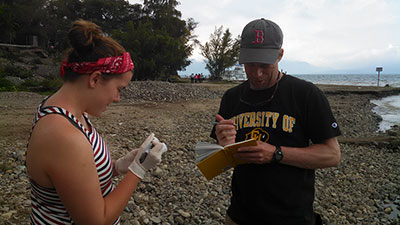Hatch sponsors Guatemala field course on water resources and sustainability
Hatch sponsors Guatemala field course on water resources and sustainability

Hatch employee Devin Castendyk accompanied the fifteen undergraduate students from the State University of New York, College at Oneonta (SUNY Oneonta), to Lake Atitlán; the deepest lake in Central America and the main water source for four lakeside communities, including the town of Santa Caterina.
For the past three years, students majoring in water resources, geology, geography, or environmental science have investigated the lake’s water quality and watershed issues, and formulated sustainable solutions. Lake Atitlán has become overloaded with human wastewater and agricultural runoff, plus sediment and trash.

The group spent three days in the lake’s watershed studying sediment erosion and geomorphology, collecting and analyzing water samples between the headwaters and the river mouth, and documenting changes in land management. They toured several existing wastewater treatment plants and evaluated their strengths, weaknesses, and efficiency. Finally, they collected and analyzed a profile of water samples from the entire water column of the lake.
Sample data was provided to AMSCLAE, the federal regulator responsible for managing the lake, and contributed to a four-year record of the college’s data for future publication. Preliminary results have shown an increase in dissolved arsenic concentrations over time, above the World Health Organization’s drinking water guideline.
In addition to this primary research, the group engaged in a variety of service, education, and outreach opportunities. Students donated and installed a solar panel on the roof of an elementary school to provide evening illumination, and taught four classes of Guatemalan fifth- and sixth-graders about water quality impacts to the lake using miniature Secchi disks (a Frisbee-like device used to monitor water clarity in lakes). Students also donated and installed water filters in six low-income homes in the town of Santa Caterina.